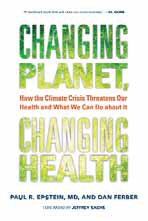SEJournal Online is the digital news magazine of the Society of Environmental Journalists. Learn more about SEJournal Online, including submission, subscription and advertising information.

BookShelf
Changing Planet, Changing Health: How the Climate Crisis Threatens Our Health and What We Can Do About It
By Paul R. Epstein, MD, and Dan Ferber
University of California Press, $29.95
Reviewed by CHRISTY GEORGE
Back when everyone was buying extra canned goods to ring in Y2K, my editor at Marketplace Radio, Stu Seidel, was soliciting story ideas.
One of the best was that the 20th Century was when humans vanquished disease with vaccines, then lost the battle by abusing them.
This idea of losing ground in the fight against disease is merely the starting point for the new book, Changing Climate, Changing Health, by Dr. Paul Epstein and Dan Ferber. It’s an egocentric and riveting tale about how the changing climate can hurt the people we love most — us.
Chapter by chapter, the authors identify the climate fingerprint in the re-emergence of epidemics from 19th Century diseases such as cholera and malaria, as well as “new” diseases such as Ebola and AIDS.
Mosquitoes can survive farther north and at higher elevations. Microbes can ride out decades-long cold spells by hitchhiking rides on the chitinous shells of zooplankton.
It’s not just human diseases that threaten us. The climate-driven spread of animal and plant diseases, such as bark beetles ravaging the pine forests of the Rocky Mountains, indirectly threatens humans when wildfires feed on the dead trees and spread to homes built in the precarious zone known as the urban-wildland interface.
Then there’s our water and food — from farms to fisheries — directly threatened by changes that by century’s end, or sooner, may create an unrecognizable Earth.
How just one degree of warming, for instance, can tip the balance for a disease to spread, undermining the sunny prognosis of climate skeptics who call climate change the greening of Earth, and crow that the northern Midwest and Canada can become the new agricultural breadbasket of North America. But what then of the South?
I’m a sucker for big-picture thinking and unified field theories. One of the big ideas in this book is the rise of systems analysis: how scientists such as Paul Epstein looked beyond their specialized silos and began connecting dots on a grand scale. As his understanding of climate change deepens, the full implications of extreme and/or abrupt climate change also dawn on the reader.
The news is not good.
Beyond the melting ice, declining snowpack, acidifying ocean, wild weather and spread of disease-carrying bugs is the global economic system as it’s being practiced in the early 21st Century. Yes, they went there.
In what was for me the most fascinating section of the book, the authors coherently condense 350 years of economic history and ideas, and explain how the failure — the deliberate undermining — of economic philosophy led to climate change, and will lead the world to a climate catastrophe if things do not change, and soon.
It’s not just economics that come under scrutiny by Epstein and Ferber. They consider the interrelationships of human choices in energy, transportation, agriculture and development, and how all that drives climate change and health problems, for people and for ecosystems.
The book ends with a blueprint for change, based on a return to true Keynesian economics, which the authors argue would be as good for business as it would be for the planet. Indeed, they point out that many businesses have been crying out for a set of rules to guide them on their own quest to reduce waste and combat climate change.
Changing Climate, Changing Health is written with great clarity, elegantly explaining tricky concepts such as negative feedback loops, and simplifying complex science into why, among other things, pests seem to prefer food crops grown in higher CO2 conditions.
One wonders about Dan Ferber’s role in the book, because most of it is written in first person from Paul Epstein’s viewpoint. I know that Ferber can report, and I know that Epstein can write.
Back in the 1970’s, I first wrote for the East Boston Community News, and remember Paul’s dispatches to the Community News from Mozambique — a sojourn that formed thebeginning of his own journey to understanding the role of climate change in promoting disease.
But the format in this book leaves it unclear who’s doing what. That quibble aside, it’s well worth reading, whether you know a little, or a lot, about climate change.
If you want to get up to speed on climate change in all its grandeur and sweep, this is a superb primer — a familiar story, told in a new way, through the lens of health. And that point of view makes the sometimes vague, sometimes wonky story of climate change something quite fresh — a story that is all about us.
Christy George, former SEJ board president, is an independent broadcast producer based in Portland.
* From the quarterly newsletter SEJournal, Summer 2011 issue.
















